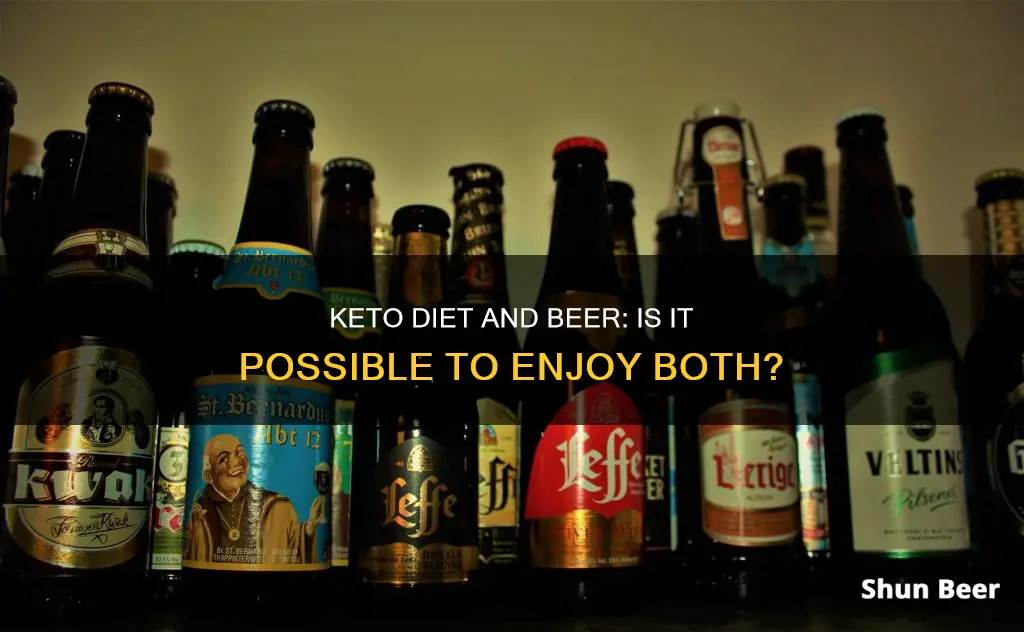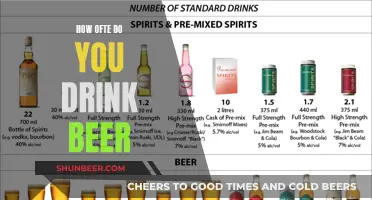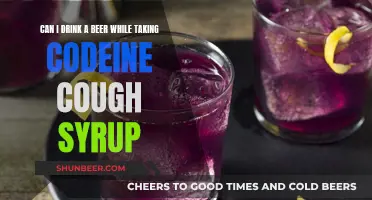
The ketogenic (keto) diet is a low-carb, high-fat diet that many people adopt to lose weight and improve their health. While on the keto diet, it is possible to drink alcoholic beverages in moderation, as long as they are low in carbs. Pure forms of alcohol like whiskey, gin, tequila, rum, and vodka are all completely free of carbs. Wine and light beer are also relatively low in carbs, usually containing under 6 grams per serving. However, regular beer is produced from starch and can contain 12 grams of carbs in just one can. Therefore, if you are following the keto diet, it is best to opt for light beers or low-carb alcoholic beverages to stay within your daily carb allotment.
What You'll Learn

Light beer is keto-friendly
Most beers have a high carb content, which can be problematic for those on the keto diet. However, light beers are a great option as they are low in carbs and calories. For example, a pale lager contains an average of 5.81 grams of carbs per can, while Corona Premier contains only 2 grams of carbs. With light beers, you can still enjoy a drink without ruining your progress.
When it comes to alcoholic drinks on the keto diet, spirits like gin, whiskey, rum, and vodka are also a good choice as they contain zero carbs and added sugar. These can be enjoyed plain or mixed with low-carb options like soda water or sugar-free tonic water.
Wine is another keto-friendly option, with red and white wine containing relatively few carbs. Dry wines, in particular, have the lowest sugar content, so they are a better choice than dessert wines.
While it is possible to enjoy these keto-friendly drinks, moderation is key. Overconsumption can impact not only your diet goals but also your health. It is recommended to limit yourself to one or two drinks, and to be mindful of your overall carb intake for the day. Additionally, alcohol can affect your judgment, potentially leading to choices that contradict your diet plan.
Beer and Flu Medication: A Safe Mix?
You may want to see also

Pure spirits are zero-carb
Pure spirits such as whiskey, brandy, cognac, vodka, gin, and tequila contain zero carbs and are the most keto-friendly alcohol choice. They are made from various forms of grains but are gluten-free and contain no carbs.
If you're craving something sweet, try a sugar-free mixer like soda water or a flavoured sparkling water instead of juice or cola. You can also add a low-carb sweetener to your drink.
When it comes to drinking on the keto diet, it's important to be mindful of your consumption. Alcohol can affect your judgement and willpower, and it can also have a stronger effect on your body when you're following a keto diet. It's best to drink in moderation—up to two drinks per day for men and one drink per day for women.
It's also important to note that alcohol doesn't help with weight loss. The body tends to burn alcohol before anything else, which can slow down your weight loss progress. If you're drinking daily, you may need to stop that routine on keto as it can stall your fat-burning process.
A Beer Lover's Guide to Mohegan Sun Fest
You may want to see also

Dry wines are low-carb
It is possible to drink alcohol on a keto diet, but it requires careful planning and moderation. Alcoholic drinks are known for being high in carbs, but some choices contain fewer carbs than others.
Dry wines are the lowest in carbohydrates. Wine is considered dry if it contains 10 grams of sugar per bottle or less. A dry wine has little to no residual sugar, whereas a sweet wine can have a significant amount. Sweeter wines have a shorter fermentation process, which means there is less time to break down the sugar, leaving more behind. This is also what gives sweet wines their sugary, fruity flavour.
Sparkling wines labelled as "Brut" or "Extra Brut" typically have the lowest amounts of residual sugar—as little as 1.5 grams of carbs (or less) per glass. Varietals like sauvignon blanc, Italian pinot grigio, and pinot blanc are also lower-carb options. One 5 oz glass of sauvignon blanc has 3 grams of net and total carbs, 0 grams of fat, and 0.1 grams of protein.
Champagne and sparkling wine contain an average of 4.68 grams of carbs per glass, so enjoying a small glass to celebrate a special event should fit within most keto diet plans.
However, it is important to remember that alcohol can hinder weight loss efforts because the body tends to burn alcohol before fat, slowing ketone production. Additionally, imbibing can increase appetite. Therefore, while an occasional glass of wine won't throw off ketosis, multiple glasses or drinking multiple days a week could hinder your goals, especially if you're trying to lose weight.
Baylor Football: Beer Drinking Allowed?
You may want to see also

Avoid sugary mixers
The keto diet is a low-carb, high-fat diet that can help with weight loss and health improvement. It involves limiting your daily carb intake to 20–50 grams to keep your body in a state of ketosis, where it burns fat for energy instead of carbohydrates.
When it comes to alcoholic beverages, it's important to choose low-carb options to stay within your daily carb limit. Pure forms of alcohol like whiskey, gin, tequila, rum, and vodka are free of carbs. Wine and light beer are also relatively low in carbs, usually containing under 6 grams per serving.
Now, let's talk about mixers. It's crucial to avoid sugary mixers when having a drink on the keto diet. Mixers like regular soda, juice, sweeteners, tonic water, and energy drinks are high in carbohydrates and can quickly turn your drink into a high-calorie, carb-laden bomb.
The Problem with Sugary Mixers
When following the keto diet, it's essential to be mindful of your mixer choices. Regular soda, juice, sweeteners, tonic water, and energy drinks are all loaded with sugar and carbohydrates. These mixers can significantly increase the carb content of your drink, potentially kicking you out of ketosis and slowing down your weight loss progress.
The Impact on Ketosis
The whole point of the keto diet is to keep your body in a state of ketosis, where it burns fat for energy instead of carbohydrates. However, when you consume sugary mixers, you're introducing a significant amount of carbohydrates into your system. This can quickly use up your daily carb allotment, taking your body out of ketosis and reducing the effectiveness of the diet.
Healthy Alternatives
Instead of reaching for sugary mixers, opt for low-carb alternatives. Diet soda, seltzer, diet tonic water, and powdered flavour packets can add flavour to your drink without the carbs. Carbonated water, flavoured sparkling water, and sugar-free sports drinks are also excellent options for mixing with your favourite spirits. These alternatives will help you stay within your carb limit and maintain ketosis.
The Calorie Conundrum
Sugary mixers not only contribute to your carb intake but also add empty calories to your drink. These empty calories provide little to no essential nutrients like protein, fibre, vitamins, or minerals. Over time, overindulging in these empty calories can increase your risk of nutritional deficiencies and contribute to gradual weight gain.
Health Risks
Excessive consumption of sugary mixers can also have adverse health effects. Alcohol itself can contribute to serious health conditions, including liver problems, cancer, and heart disease. When combined with sugary mixers, the health risks may be exacerbated. It's important to prioritise your health and choose low-carb, low-calorie mixers to moderate your intake and minimise potential health risks.
Staying on Track
Remember, the keto diet requires careful planning and discipline. Alcohol can impair your judgment and willpower, making it harder to stick to your diet. By avoiding sugary mixers, you not only keep your carb intake in check but also make it easier to adhere to the keto diet guidelines. This helps ensure the effectiveness of the diet and brings you closer to your health and fitness goals.
Wellbutrin and Beer: Is It Safe to Mix?
You may want to see also

Alcohol may slow weight loss
Alcoholic drinks are often referred to as "empty" calories. This means that they provide your body with calories but very few nutrients. A recommended afternoon snack should have between 150 and 200 calories. A night out with several drinks can lead to consuming a few hundred extra calories. Drinks with mixers, such as fruit juice or soda, contain even more calories.
When alcohol is consumed, it is burned first as a fuel source before your body uses anything else. This includes glucose from carbohydrates or lipids from fats. When your body is using alcohol as a primary source of energy, the excess glucose and lipids are stored as fat.
Excess alcohol consumption can lead to alcoholic fatty liver, which can damage your liver and affect the way your body metabolises and stores carbohydrates and fats. Changes in the way your body stores energy from food can make it very difficult to lose weight.
Alcohol can also affect your sleep. Research suggests that alcohol can lead to increased periods of wakefulness during sleep cycles. Sleep deprivation can lead to an imbalance in the hormones related to hunger, satiety, and energy storage.
Alcohol can also negatively impact your digestion and nutrient uptake. Alcohol can cause stress on the stomach and intestines, leading to decreased digestive secretions and movement of food through the tract. Alcohol intake can lead to impaired digestion and absorption of nutrients, which can affect the metabolism of organs that play a role in weight management.
Finally, alcohol can affect your judgment and willpower. It can lower inhibitions and lead to poor decision-making, especially when it comes to food choices. Alcohol can trigger hunger signals in the brain, leading to an increased urge to eat.
Is Day-Old Beer Safe to Drink?
You may want to see also
Frequently asked questions
The answer is not so clear-cut. While most beers have a high carb content, there are a few light and low-carb beers that you can enjoy in moderation. Some examples are Corona Premier, Miller Lite, and Bud Light Next.
Spirits like gin, whiskey, vodka, and tequila are suitable drink choices for people following a keto diet. These drinks are low-calorie and contain zero added sugar and zero carbs. Wine, particularly dry varieties, are also keto-friendly options. Champagne and sparkling wine contain an average of 4.68 grams of carbs per glass.
It is important to limit your consumption, watch out for sugary mixtures, and monitor your carb intake. Alcohol can affect your judgment and willpower, which may cause you to break your diet. Additionally, the body may use energy from alcohol before using ketones from body fat, potentially limiting the effect of the diet.







